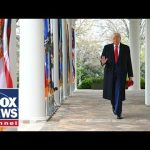President Trump announced a 90-day freeze on tariffs for most countries after global markets plunged under the weight of his aggressive trade policies. Stocks rallied immediately, with the Dow jumping over 700 points as investors breathed a sigh of relief. The move came after 75 nations rushed to negotiate with the White House, avoiding retaliatory measures Trump warned would “crush” their economies.
While others got a temporary 10% rate, Beijing faced a punishing 125% tariff hike. Trump blasted China’s “lack of respect” for America, vowing to end decades of trade exploitation. This hardline stance reinforces his promise to put American workers first, even if it means escalating tensions with a geopolitical rival.
Business leaders had warned Trump’s earlier tariffs risked triggering a recession. JPMorgan CEO Jamie Dimon called the policies “reckless,” while markets lost trillions in days. But the 90-day pause shows Trump’s willingness to flex strength and flexibility—rewarding cooperation while crushing defiance. It’s a classic Trump negotiation tactic: maximum pressure followed by strategic retreats to secure better deals.
The administration claims this “economic independence” agenda will revive U.S. manufacturing. By pausing tariffs for allies, Trump avoids immediate consumer price spikes while forcing long-term concessions. Critics call it chaos, but supporters see a masterstroke—forcing nations to the table without backing down on core America First principles.
China’s exclusion signals a deepening divide. With decoupling accelerating, companies face tough choices: leave China or face ruinous costs. Conservatives argue this裂痕 is necessary to stop intellectual property theft and rebuild domestic industries hollowed out by globalization.
Wall Street’s rebound proves markets still trust Trump’s dealmaking instincts, despite the rollercoaster. The pause gives businesses clarity after days of panic, though permanent damage lingers for firms that sold assets during the turmoil. Treasury Secretary Scott Bessent teased “bespoke” deals with each country, suggesting tailored agreements favoring U.S. interests.
Democrats and globalists slammed the tariffs as a tax on Americans, but Trump remains unfazed. “We subsidized the world too long,” he declared, arguing short-term pain secures future prosperity. With 2026 midterms looming, this gamble tests whether voters prioritize immediate costs or long-term economic nationalism.
The 90-day window is a temporary ceasefire, not surrender. Trump warned he’ll restart tariffs if nations stall negotiations—a sword of Damocles to keep them “in line.” For conservatives, it’s a bold blueprint: wield American power unapologetically, reject globalist weaknes, and finally end the era of U.S. decline.




